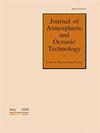Deep Learning–Based Prediction of Kuroshio Path South of Japan
IF 1.9
4区 地球科学
Q2 ENGINEERING, OCEAN
引用次数: 0
Abstract
Variation of the Kuroshio path south of Japan has an important impact on weather, climate, and ecosystems due to its distinct features. Motivated by the ever-popular deep learning methods using neural network architectures in areas where more accurate reference data for oceanographic observations and reanalysis are available, we build four deep learning models based on the long short-term memory (LSTM) neural network, combined with the empirical orthogonal function (EOF) and complete ensemble empirical mode decomposition with adaptive noise (CEEMDAN), namely, the LSTM, EOF–LSTM, CEEMDAN–LSTM, and EOF–CEEMDAN–LSTM. Using these models, we conduct long-range predictions (120 days) of the Kuroshio path south of Japan based on 50-yr ocean reanalysis and nearly 15 years of satellite altimeter data. We show that the EOF–CEEMDAN–LSTM performs the best among the four models, by attaining approximately 0.739 anomaly correlation coefficient and 0.399° root-mean-square error for the 120-day prediction of the Kuroshio path south of Japan. The hindcasts of the EOF–CEEMDAN–LSTM are successful in reproducing the observed formation and decay of the Kuroshio large meander during 2004/05, and the formation of the latest large meander in 2017. Finally, we present predictions of the Kuroshio path south of Japan at 120-day lead time, which suggest that the Kuroshio will remain in the state of the large meander until November 2022.基于深度学习的日本南部黑潮路径预测
日本南部黑潮路径的变化由于其独特的特征而对天气、气候和生态系统产生重要影响。基于近年来流行的基于神经网络的深度学习方法,结合经验正交函数(EOF)和带自适应噪声的完全集成经验模态分解(CEEMDAN),构建了基于长短期记忆(LSTM)神经网络的深度学习模型LSTM、EOF - LSTM、CEEMDAN - LSTM和EOF - CEEMDAN - LSTM。利用这些模型,我们基于50年的海洋再分析和近15年的卫星高度计数据,对日本南部的黑潮路径进行了长期预测(120天)。结果表明,EOF-CEEMDAN-LSTM模型在四种模型中表现最好,对日本南部黑潮路径的120 d预测异常相关系数约为0.739,均方根误差为0.399°。EOF-CEEMDAN-LSTM模型成功地再现了2004/05年黑潮大河曲的形成和衰减,以及2017年最新一次大河曲的形成。最后,我们提出了对日本南部黑潮路径120天前的预测,这表明黑潮将保持在大蜿蜒的状态,直到2022年11月。
本文章由计算机程序翻译,如有差异,请以英文原文为准。
求助全文
约1分钟内获得全文
求助全文
来源期刊
CiteScore
4.50
自引率
9.10%
发文量
135
审稿时长
3 months
期刊介绍:
The Journal of Atmospheric and Oceanic Technology (JTECH) publishes research describing instrumentation and methods used in atmospheric and oceanic research, including remote sensing instruments; measurements, validation, and data analysis techniques from satellites, aircraft, balloons, and surface-based platforms; in situ instruments, measurements, and methods for data acquisition, analysis, and interpretation and assimilation in numerical models; and information systems and algorithms.

 求助内容:
求助内容: 应助结果提醒方式:
应助结果提醒方式:


